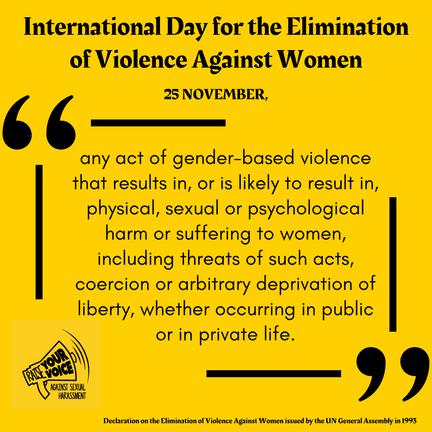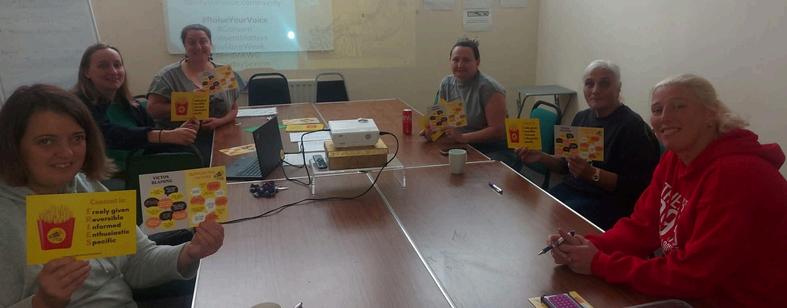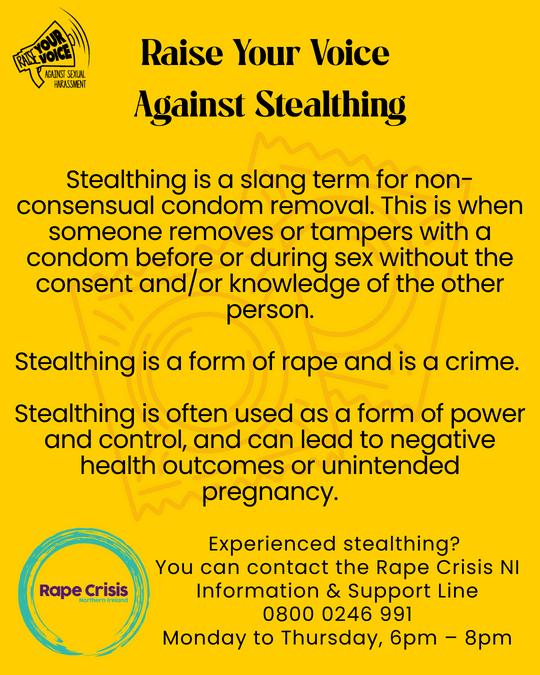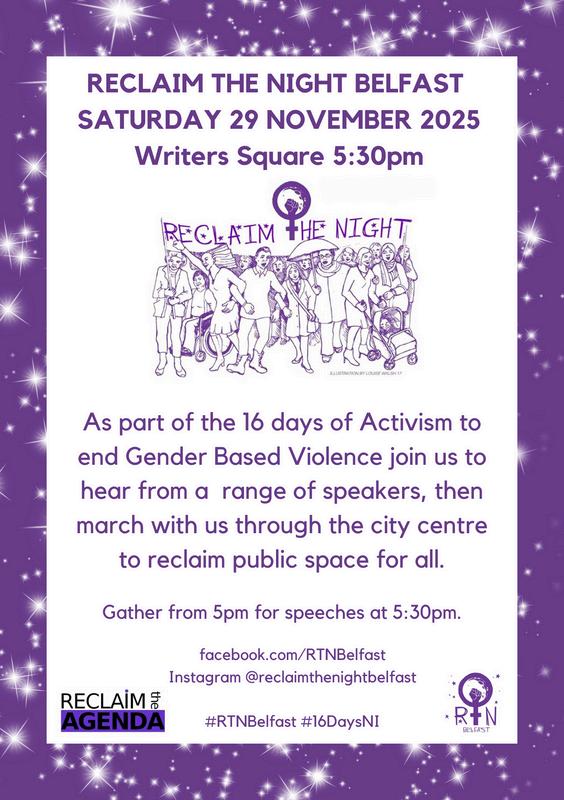

Engagement with Councils

Raise Your Voice partner NIRWN met with Lyndsey Grey of Lisburn and Castlereagh City Council to champion women’s inclusionintheborough’sGoodRelationswork. The conversation spotlighted the Raise Your Voice project its role in advancing the Good Relations agenda, amplifying the Executive commitment to ending violence against womenandgirls,andcreatingnewopportunitiesforCouncil andcommunityengagement.
As well as meetings with Fermanagh and Omagh Council and Belfast City Council, we hosted a stall at Armagh, Banbridge and Craigavon Council’s End Violence Against WomenandGirlsinformationsharingevent Thisgaveusa chance to catch up with other Regional Change Fund partners and meet groups who will be delivering work undertheLocalChangeFund.
Greenway Women’s Centre


Women from Greenway Women’s Centre, pictured here with Raise You Voice CoordinatorSarah,tookpartintwoworkshopswithRaiseYourVoice:
Let’sTalkaboutSexualHarassmentandBystanderinterventions EverythingyouwantedtoknowaboutCONSENTbutwereafraidtoask.
The women thought the workshops were extremely beneficial and felt strongly this informationwasneededinschools.
Our workshops can be delivered as stand alone events, or as a programme like at Greenway. Raise Your Voice are offering our workshops to community groups, workplaces, sports teams and more, fully funded, all over Northern Ireland
Find out more and book your workshop by emailing contact@raiseyourvoice.community or visit www.raiseyourvoice.community/host-a-workshop
The role of Gender Budgeting in tackling Violence Against Women and Girls
AoifeMallon,ResearchandEngagementAssociate,UlsterUniversity
Violence against women and girls (VAWG) is one of the most pressing issuesfacingsocietiesandeconomiesall overtheworld Whilethemostsignificant cost of VAWG must be understood on an individual level, it is important to recognise that it also has significant financial costs The global cost of VAWG is estimated to be at least 1.5 trillion dollars. In the UK, VAWG costs the Government an estimated £40 billion annually and in the Republic of Ireland this cost is approximately €2.7 billion annually.
Over the past three decades, countries around the world have been changing how they think about public spending. Increasingly, governments are recognising that to spend public money more efficiently, they have to better understandwhatthedifferentimpactsof spending will be on different groups in society

Many of these governments are doing this by adopting an approach called ‘gender budgeting’ where the equality impacts of budgets are considered through a gender lensatallstagesofdecision-making Forexample,countriessuchasCanada,Sweden and Australia have developed advanced ways of tracking the impact of public spendingongenderequalityandequalitymoregenerally
GovernmentbudgetscanbeapowerfuldriverfortacklingissuessuchasVAWGifthey areusedeffectively.Genderbudgetingtools,suchasgenderimpactassessments,help governments think differently about how they are spending money, who is benefitting most from the investment, and which groups are being left behind. In the context of VAWG, gender budgeting tools can be used to better understand who is being impacted by VAWG, who is perpetrating VAWG, which services are supporting victims of VAWG, and what additional support is needed from government. For example when the Northern Ireland Executive, which The Executive Office leads on, was drafting their Strategy to End Violence Against Women and Girls (EVAWG), the team undertook extensive consultation with key stakeholders so that the Strategy could be accurately costedaccordingtotheneedsofdifferentequalitygroups.Importantly,acleargender lens was maintained throughout this analysis to ensure that intersectional equality impactswerecapturedandmitigatedagainst
TheJRCTGenderBudgetingProjectisworkingtosupporttheimplementationofgender budgeting in Northern Ireland This project is made up of researchers from Ulster University and civil society representatives from the Northern Ireland Women’s Budget Group. By combining research with grassroots advocacy, the project aims to increase awarenessofgenderbudgetingamongcivilsociety,thecivilservice,publicbodiesand Government Departments We believe that gender budgeting is crucial for maximising the efficiency and effectiveness of public spending and achieving more equitable outcomesforallpeoplelivinginNorthernIreland. TofindoutmoreaboutourprojectandtoreadourfourARKWorkingPapersongender budgeting,pleasevisit: https://www.ark.ac.uk/ARK/projects/Gender Budgeting/
What is Economic Abuse?
SharonCoyle,TrainingandPartnershipsManager,SurvivingEconomicAbuse
Economic abuse is one of the lesser-known forms of domestic abuse, yet it is a devastating form of coercive control and violence against women and girls, and it is rife in Northern Ireland
16%ofwomeninNorthernIrelandexperiencedeconomicabuseinthepastyear,that'salmost oneinsix(Ipsos&SEA,2024)
At Surviving Economic Abuse (SEA) , the only UK charity dedicated to raising awareness of economic abuse and transforming responses to it, we define it as a perpetrator restricting, exploiting, or sabotaging a victim-survivor's access to the resources she needs to be safe and independent. This can include money, housing, education, employment, transport, utilitiesandevenfood.
When I use the phrase economic abuse, people often ask, “Isn’t that just a fancy term for financial abuse?” But financial abuse is only one part of it Economic abuse isn’t just about moneyit’saboutpowerandcontrol,reachingintoeveryareaofawoman’slife
A perpetrator may coerce a victim-survivor into debt, refuse to pay shared bills or a mortgage, or restrict the sale of property. They may exploit financial products like bank accounts, credit cards, loans, pensions and insurance. Others sabotage employment or education,purposelymakingawomanlateorabsentuntilshelosesherjoborcourseplace.
Withouteconomicsafety,thereisnophysicalsafety Whenaperpetratorcontrolseconomic resources,itbecomesincrediblydifficulttoleave AndhereinNorthernIreland,whereweface a femicide crisis, it’s important to note that Home Office data shows a third of domestic homicidesincludeevidenceofeconomicissues.
Economic abuse often escalates post-separation. Perpetrators may refuse child maintenanceorweaponisethecourtsystem,leavingvictim-survivorswithhugelegaldebts Refuge’sKnowEconomicAbuseresearchfound45%ofvictimscouldn’tgetacreditcard,and aquartercouldn’tbuyahomeasaresultofcreditratingsdestroyedbyeconomicabuse
SEA successfully campaigned for economic abuse to be recognised in England and Wales’ DomesticAbuseAct2021.Whileit’snotyetnamedinNorthernIreland’slegislation,itcanstill beaddressedascoercivecontrol.
If we want to end violence against women and girls, we must start recognising and respondingtoeconomicabuse
SurvivingEconomicAbuseoffers specialisttraining,includingfunded spacesthroughBelfastCityCouncil’s EndingViolenceAgainstWomenandGirls LocalChangeFund.
Contact:
sharon.coyle@survivingeconomicabuse.org wwwsurvivingeconomicabuseorg
Ifyou’veexperiencedeconomicabuseor aresupportingsomeonewhohas,visit survivingeconomicabuseorg/i-need-help forsupportandresources.

You are the best indicator of your own health and well-being, and this relationshipswithothers.IfyoufeeluneasyaboutyourHead,Shoulders,Knee mightwishtospeakwithatrustedpersonorprofessional.
Coercive Control is Abuse - Check in With Yourself
The campaign builds on engagement with stakeholders and evidence-bas gender-based violence and related risks in our communities Currently in includingamediacampaignandtrainingover40professionalsandfrontline willberolledout2026
5 Books That Could Save Your Life webinar
The 5 Books That Could Save Your Life Project examines why victims of coercive control find themselvestrappedin‘invisiblechains’,explores‘dangerousrelationshipsandhowtheyend in murder’ and considers barriers to recognising and responding to coercive control They discusswhyaradicalnewall-islandapproachisessentialtoeliminatedomestic,sexualand gender-based abuse from our society At the closing webinar hear from authors Prof Jane Monckton-Smith,ProfKateFitz-Gibbon,ProfSandraWalklate,DrLisaAronsonFontesandLuke Hart who will discuss their books, their motivations for writing them, and the importance of sharingknowledge.
This project is coordinated by Haven Horizons in partnership with Reclaim the Agenda and Belfast & Lisburn Women’s Aid, and supported by the Shared Island Civic Society Fund, DepartmentofForeignAffairs
Thursday20November1pm:Webinarwithauthors
Findoutmoreandregister
https://havenhorizonscom/5-books-that-could-save-your-life/

Raise Your Voice - Out and About
Nigerian Community NI took part in two workshops Let’sTalkAboutSexualHarassment andConsent&Victim-Blaming—withbothmen and women participating. Discussions explored sexistandraciststereotypesandtheimportance of consent in relationships The group showed strong engagement and commitment to ending violenceagainstwomenandgirls.
We vistited LGBTQ+ Women’s Group to deliver a Raise Your Voice workshop on Allyship and Bystander Intervention for one of their regular weekly meet ups following a busy Newry Pride. The group have secured funding to deliver a programme of work through the Local Change FundoftheEndingViolenceAgainstWomenand GirlsStrategy
RaiseYourVoicehostedaninformationstallata verysunnyLurganPrideinthePark
We also had stalls at Newry Pride and Trans PrideBelfastbuttheywereagoodbitrainier! Wetalkedabouttheimportanceofallyship,and how gender based violence can impact the LGBTQ+community.
Raise Your Voice delivered a workshop on Bystander Intervention at the Secondary Student’s Union NI General Assembly This was attended by representatives of over 15 schools from all over the province We had a great discussion with the young people about the different tools they could use to tackle sexual harassment.
Safe Leave implementation can’t come soon enough
ByElaineCrory,Women’sSectorLobbyist
The Domestic Abuse (Safe Leave) Act (Northern Ireland) was passed in 2022. You might not have heard about this, because it has not yet been implemented, and because it came about as a result of a private member’s bill, but it is a piece of legislation with the power to helptransformlives,andmaybeeventosavethem
We know that domestic abuse is a very significant part of the epidemic of violence against womenandgirls,andthatitisonethatisespeciallylikelytoleadtothemostextremeforms ofviolence,withtheoverwhelmingmajorityofwomenwhohavebeenmurderedherehaving been killed by their abuser As such, it is obvious that we should do everything within our power to enable people trapped in abusive situations to leave as early as possible This Act contributes to that by guaranteeing ten days of paid leave for survivors of domestic abuse These days can be essential for handling the kinds of issues that arise in these kinds of situations; moving house, seeking medical or mental health help, settling children in a new school, and so on. All those factors are the kinds of barriers that contribute to a survivor feelinglikeleavingisimpossiblydifficultandcomplicated.
The proposer of the Bill, Rachel Woods, met withsurvivorsandconductedanonlinesurvey toinformthedraftingoftheBill,andtherewas independent evidence that it was needed; research from ICTU showed that over 80% of survivors who responded said that their work performance had suffered because of the abusethattheylivedthrough,includingbeing forced to take time off. This obviously costs their employer too, and it costs the whole economy; the Home Office estimates that lost hours from domestic abuse alone costs around £400 million per year Passing this legislation and making this form of leave a legal right is something with a small up front costbutanenormoussocialbenefit,aswellas an economic benefit. Most importantly, knowing that this option is available will help those barriers to disappear, providing a clear path and a glimmer of hope for survivors preparingtoleavetheirabuser
TheAssemblyagreedthatthisBillshouldpass, and it did so in March 2022. Still, however, we arewaitingtoseeitbeoperationalised.Tosay that this is disappointing is an understatement True, not long after this passed the Assembly collapsed until early 2024, but several other laws passed the same month – some even on the same day – have since been enacted, even when the Assembly was down. Last year, the Department for the Economy consulted on regulations, but a year onwearestillwaitingforthelawtobecomea reality
The women’s sector, and most importantly survivors, await progress, expected in 2026. It cannotcomesoonenough.
JOIN US

Contribute to the e-zine Contribute to the e-zine
Shop our merchandise! Shop our merchandise!
Support our work & campaign by shopping at raiseyourvoice community/merchandise
Like what you see? To submit an article for or share your resources in the next issue of the e-zine, contact Raise Your Voice! Special thanks: Special thanks:
Women’sResourceandDevelopmentAgencyispleasedtobeoneofthe8 organisationsdeliveringontheNIExecutive’sRegionalChangeFundtoEnd ViolenceAgainstWomenandGirls,expandingourRaiseYourVoiceProject withpartnersRTA,WSN,andNIRWN
ThispublicationisgrantaidedbyBelfastCityCouncilandTEO Theviews expressedarenotnecessarilysharedorendorsedbytheCouncil.The Councildoesnotacceptanyresponsibilityorliabilityforsame
TheExecutiveOffice(TEO)EVAWGProgrammerunstheChangeFund throughBelfastCityCouncil(BCC)whichcontributestothispublication; indoingso,TEO/EVAWGholdnoresponsibilityforthecontentandarenot necessarilyendorsingallcontentused








